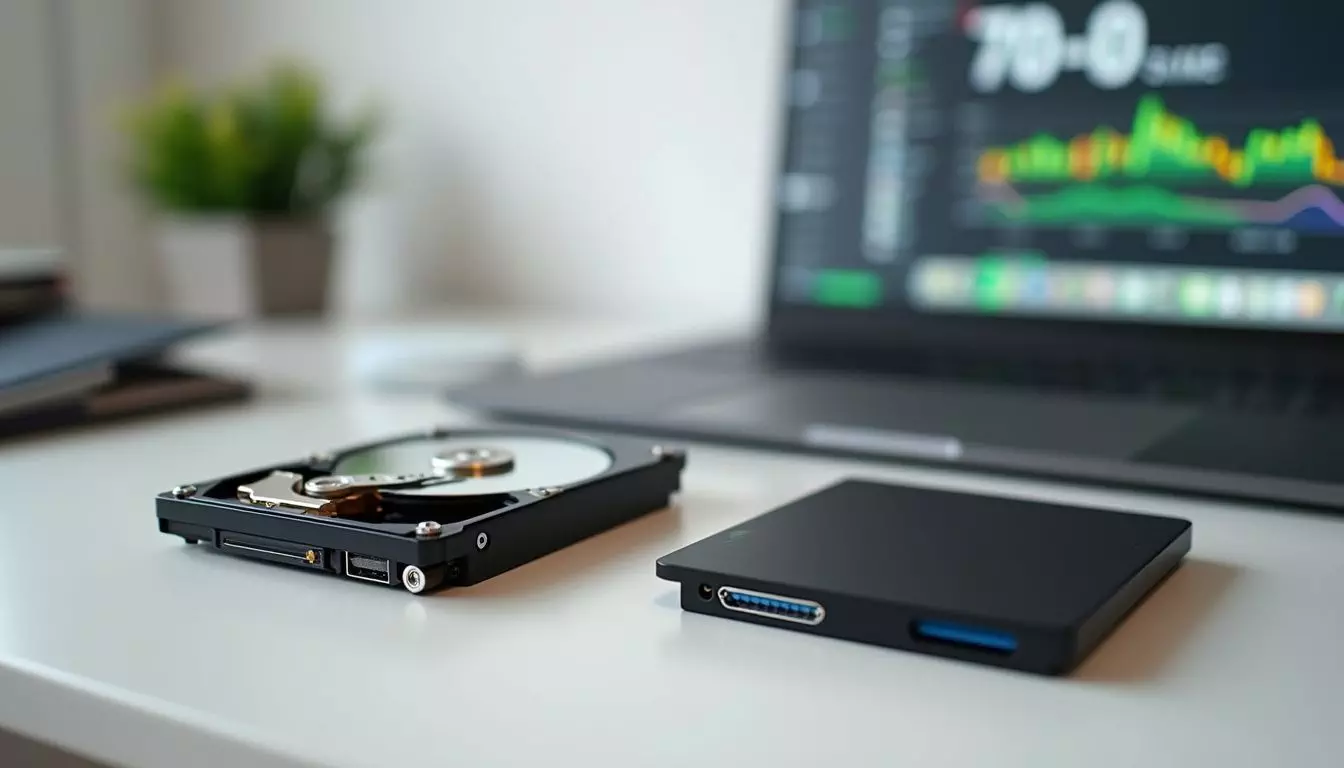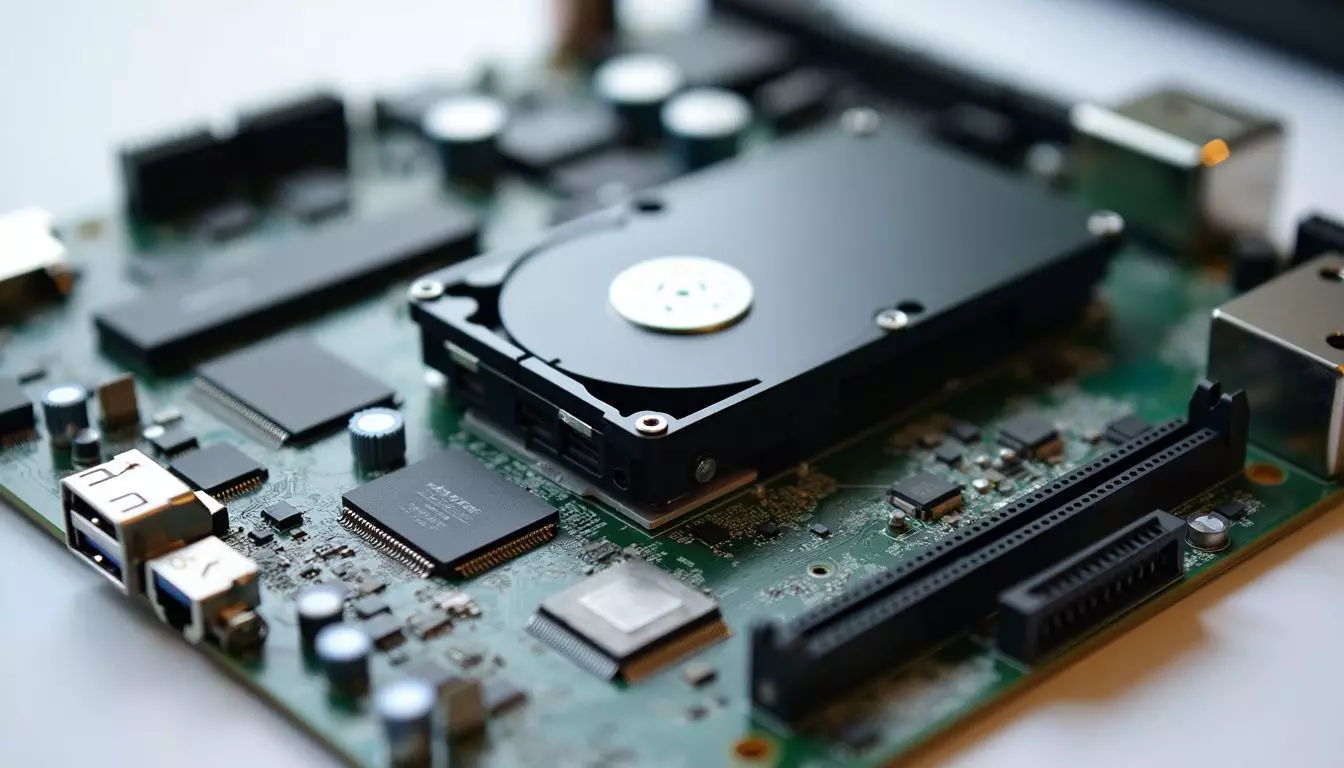Are HDDs good for gaming? Many gamers wonder if their choice of storage affects performance. The short answer is yes—but there’s more to it. This blog explores the key differences between HDDs and SSDs, especially how they relate to gaming. 1
Alex Herrick, with expertise in web design and research, explores this topic based on his years of experience understanding tech needs. Read on for a comprehensive look at optimizing your game’s performance through smart storage choices. 2
Key Takeaways
- SSDs are faster: SSDs reduce load times and improve game performance. They use flash memory, making them much quicker than HDDs.
- HDDs offer more space for less money: HDDs give you a lot of storage at a lower cost per gigabyte. A 2TB HDD costs about $60, while a 2TB SSD costs around $90.
- Mixing storage types is smart: Use an SSD for fast boot times and quick game loads. Store your large game library on an HDD to save money.
- SSDs boost system speed: Switching from an HDD to an SSD makes your entire computer run faster. Start-up times shorten, and games load quicker.
- HDDs are good for bulk storage: If you need lots of space without spending too much, choose an HDD. They can hold over 2TB of data easily and cheaply.
Overview of HDD and SSD in Gaming

HDDs and SSDs both store your games, but they are not the same. HDDs have moving parts, while SSDs use flash memory. HDDs are cheaper and offer more storage capacity, but they are slower and less durable than SSDs. On the other hand, SSDs are faster, more power-efficient, and more reliable, making them ideal for gaming. To explore the memory game versus computer ram, it is important to understand the differences in performance and durability between HDDs and SSDs. Ultimately, the choice between the two depends on your budget, storage needs, and gaming preferences.
Performance Differences
SSDs can reduce load times and improve how games run. They use flash memory, which means no moving parts… leading to faster speeds. PCIe NVMe M.2 SSDs are up to 10 times faster than SATA SSDs, making them ideal for gaming PCs.
This speed helps in modern games where every second counts. 2
Hard drives (HDDs) rely on spinning disks and a read/write head—this slows down performance. Random read/write speeds for HDDs can’t compare with SSD’s IOPS rates. In gaming terms, this affects the time it takes to load levels or save progress. 1
Price ComparisonFor gamers seeking speed, SSDs are a game-changer.
When comparing HDDs to SSDs for gaming, price plays a key role. Check out the following price breakdown:
| Storage Type | Capacity | Approx. Price | Cost per GB |
|---|---|---|---|
| HDD | 2TB | $60 | $0.03 |
| SSD | 2TB | $90 | $0.045 |
The price per gigabyte is lower for HDDs. 1 The 2TB internal 3.5-inch HDD costs around $60. Cheaper 2.5-inch SSDs start at about $90. 2 When considering storage needs ranging between 500GB to 2TB, the cost difference is noticeable.
Now, let’s explore the benefits of SSDs for gaming…
Benefits of SSDs for Gaming
SSDs make games load faster, making gameplay smoother. They also boost the computer’s overall speed and efficiency… better than HDDs!
Faster Load Times
SSDs drastically cut game load times. They save hours of gameplay by reducing wait times. For example, an SSD can have you in-game in seconds, while an HDD might take minutes. 1
Users enjoy smoother gameplay with faster graphics rendering on SSDs. This prevents annoying texture pop-ins and enhances the overall experience. Upgrade to an SSD for quick access and more playtime! 3Improved System Responsiveness
Switching to an SSD greatly boosts system responsiveness. 2 Gamers will notice quicker startup times and smoother game performance. 1 Lower access times on SSDs mean your computer reacts faster during intense gaming sessions.
Imagine playing a fast-paced game like “Cyberpunk” without lag—an SSD makes that possible. The improved speed ensures gameplay is fluid, reducing delays when loading new levels or saving progress. 2
Upgrading from an HDD to an SSD can significantly improve gaming performance.
Next, let’s look at when it might make sense to use HDDs for gaming…
When to Consider HDDs for Gaming
Sometimes, you need lots of space for games. HDDs can store many large files without emptying your wallet….
High Capacity Storage Needs
HDDs offer vast storage at low prices. They are perfect for gamers with many large games. HDDs can easily store more than 2TB of data, making them ideal for storing lots of games and files. 4
Gamers often pair an HDD with SSD to balance speed and space. Use the SSD for quick boot times and load speeds, while the HDD holds your big game library. This combo gives you both high capacity and best performance without spending too much. 2Cost-Effectiveness for Bulk Storage
For those needing large storage at a low price, HDDs shine. A 2TB internal 3.5-inch HDD costs about $60—far cheaper than a similar SSD. 5 This makes them ideal for bulk storage of games and media files.
While slower and less durable, they offer massive capacities without breaking the bank. Gamers with lots of data will find these drives perfect for storing their collections… leading up to troubleshooting tips if your computer won’t boot! 1
Troubleshooting Tips for Gamers: When Your Computer Won’t Boot
Sometimes, computers don’t boot up. This can be frustrating, especially for gamers. Let’s look at some troubleshooting tips.
- Check Power Supply
Ensure the computer is plugged in properly. Use a known good outlet. Look for any damage to power cables.
- Inspect Cables and Connections
Confirm all internal and external cables are secure. Verify connections to the motherboard, graphics card, and drives.
- Listen for Beeps or Look for LEDs
Listen for beep codes when turning on the PC. Check any diagnostic LEDs on the motherboard, which hint at issues.
- Reset BIOS/UEFI Settings
Enter BIOS/UEFI by pressing a key during startup (usually F2, F10, Delete). Choose the option to reset settings to default.
- Test with Minimal Hardware
Remove extra components like additional RAM or GPUs (graphics processing units). Try booting with only essential parts like keyboard and monitor attached.
- Swap or Reseat RAM Modules
Remove memory modules and reinsert them firmly into their slots. If still no boot, try one module at a time in different slots.
- Examine Storage Drives
Unplug HDDs and SSDs except the primary storage drive containing your operating system (OS). A faulty drive can prevent booting.
- Verify Graphics Card Seating
Make sure the GPU is fully inserted in its PCI Express slot and connected securely to its power supply if it requires one.
- Check Temperatures and Fans
Review if fans are spinning upon powering up or check CMOS temperature readings via BIOS/UEFI to rule out overheating issues.
- Swap Out Components Where Possible
Use alternate parts like another power supply unit (PSU) or different RAM sticks from a working system.
These steps help identify why your gaming rig isn’t starting up… Fixing common problems yourself saves time!https://www.youtube.com/watch?v=hUGt0M6YhsU
Conclusion
SSDs are the best choice for gaming. They load games faster and make the system more responsive. HDDs work well when you need lots of space at a lower cost. Mixing SSDs and HDDs can give gamers both speed and storage.
Choose wisely based on your needs!
For detailed guidance on what to do when your computer won’t boot, visit our troubleshooting guide.
FAQs
1. Are HDDs good for gaming?
HDDs can work for gaming, but they are slower than SSDs. This means longer load times and less smooth gameplay.
2. Should I choose an SSD or HDD for my games?
An SSD is generally better for gaming because it has faster read and write speeds, which improves game performance.
3. What’s the difference between an HDD and an SSD in terms of gaming performance?
The main difference is speed—SSDs are significantly faster than HDDs, leading to quicker boot times and smoother gameplay.
4. Can using a slow HDD affect my frame rates in games?
Yes, a slow HDD can cause stuttering and lower frame rates because it takes longer to load game data.
5. Is upgrading to an SSD worth it for gamers?
Upgrading to an SSD is worth it if you want faster load times, better overall game performance, and efficient energy use.
6. Do I need an NVMe SSD or will a regular SATA SSD be enough for gaming?
A regular SATA SSD offers great improvements over an HDD; however, NVMe SSDS are even faster—ideal if you want the best possible performance.
References
- ^ https://www.crucial.com/articles/for-gamers/hdd-or-ssd-for-gaming
- ^
- ^ https://primetechsupport.com/blogs/gaming-pc-repairs/hdd-vs-ssd-gaming-performance-choose-the-best-option-for-gaming?srsltid=AfmBOoqzZdJZfj9NlVjMeT_Pcad5UOfMg9h1S63AWEsnAW6R8_PE5-lL (2023-09-18)
- ^ https://www.seagate.com/ca/fr/blog/ssd-or-hard-drives-for-gaming/ (2024-08-21)
- ^ https://www.pcmag.com/comparisons/ssd-vs-hdd-whats-the-difference (2024-07-26)

